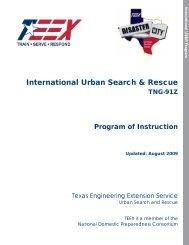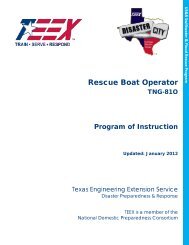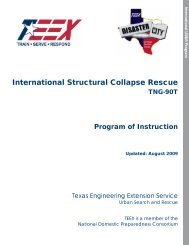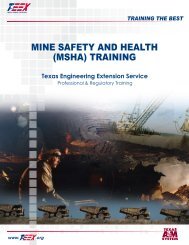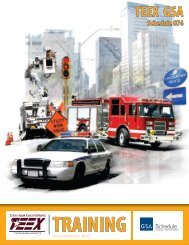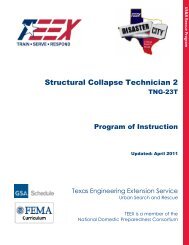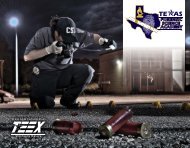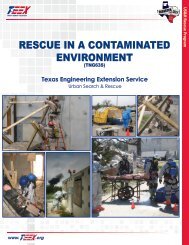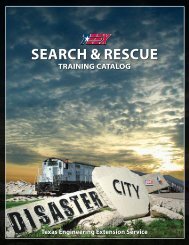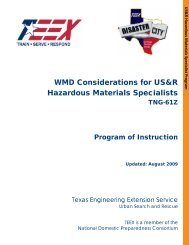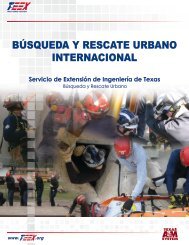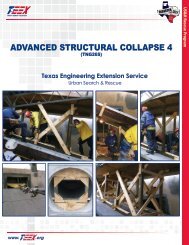PUBLIC SAFETY & SECURITY - Texas Engineering Extension Service
PUBLIC SAFETY & SECURITY - Texas Engineering Extension Service
PUBLIC SAFETY & SECURITY - Texas Engineering Extension Service
Create successful ePaper yourself
Turn your PDF publications into a flip-book with our unique Google optimized e-Paper software.
TE<br />
AS<br />
FORENSIC<br />
SCIENCE<br />
ACADEMY<br />
TM<br />
Courtroom Testimony — FSA111*<br />
40 Hours<br />
The 40-hour Courtroom Testimony course provides participants<br />
with an understanding of the basic factors that create effective<br />
courtroom testimony. Course instruction is through lecture and<br />
practical application.<br />
Forensic science academy<br />
Basic Criminal Investigation<br />
— FSA105*<br />
40 Hours<br />
The Basic Criminal Investigator (BCI) course prepares participants<br />
for their transition from a traditional patrol/traffic function to an<br />
investigative position such as detective. The BCI course is also<br />
appropriate for agencies that require officers to perform both<br />
patrol and investigative functions. The course prepares officers to<br />
manage a wide variety of common criminal investigations, from a<br />
response to the initial scene to case preparation and presentation<br />
for prosecution. Emphasis is placed on managing the legal processes<br />
involved in investigations, including preparation of affidavits,<br />
procurement and execution of search and arrest warrants, interview<br />
and interrogation procedures, and rules governing the collection<br />
and preservation of evidence. Additionally, participants will learn<br />
case preparation techniques and unique aspects of special topic<br />
investigations such as narcotics, property crimes, and crimes against<br />
persons.<br />
Topics<br />
• Basic principles of criminal investigation<br />
• Interview and interrogation techniques<br />
• Utilizing informants<br />
• Crime scene investigation<br />
• Subpoenas, warrants and search warrants<br />
• Case preparation<br />
• Narcotics investigations<br />
• Property crime investigations<br />
• Crimes against persons investigations<br />
• Other types of investigation<br />
Audience<br />
Law enforcement, security, private investigators.<br />
Bloodstain Pattern Analysis I<br />
— FSA103*<br />
40 Hours<br />
The Bloodstain Pattern Analysis I course is designed for those who<br />
investigate crime scenes containing blood evidence, such as assaults<br />
and death investigations, as well as those who process bloodstained<br />
evidentiary items. The course provides participants with basic<br />
knowledge of bloodstain pattern analysis, including methods and<br />
skills for the interpretation of bloodstain evidence at crime scenes<br />
and on evidentiary items. Participants will learn to make determinations<br />
such as the relative positions of the victim or suspect, the<br />
nature of the force and object used, and the approximate number of<br />
blows struck. Course instruction is through lecture and case review<br />
with emphasis on experiments and practical application.<br />
Topics<br />
• History of bloodstain pattern analysis<br />
• Utilizing bloodstain pattern analysis at crime scenes<br />
• Measuring bloodstains<br />
• Determining the angle of impact of bloodstains<br />
• Determining point of convergence of bloodstains<br />
• Determining point of origin of bloodstains<br />
• Identification and analysis of bloodstain patterns<br />
• Documenting crime scenes<br />
• Biological hazards in crime scenes<br />
• Chemical processing of crime scenes<br />
• Bloodstain pattern analysis and courtroom testimony<br />
Audience<br />
Law enforcement investigators and noncommissioned personnel assigned to crime<br />
scene investigation and reconstruction.<br />
Topics<br />
• Curriculum vitae/resume writing<br />
• Universal communication skills<br />
• Report preparation<br />
• Testifying in court<br />
Audience<br />
Law enforcement investigators and noncommissioned personnel assigned to crime<br />
scene investigation and reconstruction.<br />
Crime Scene Investigation — FSA106*<br />
40 Hours<br />
The Crime Scene Investigation course provides participants with<br />
information, techniques, and methodologies for conducting<br />
investigations ranging from general crime scene investigations to<br />
death investigations. Course instruction is through lecture and case<br />
review with emphasis on practical application.<br />
Topics<br />
• Crime scene searches and legality<br />
• Preparation for crime scene investigations<br />
• Crime scene documentation<br />
• Collection, packaging, and preservation of evidence<br />
• Fingerprints and fingerprint processing<br />
• DNA evidence<br />
• Electronic evidence<br />
Audience<br />
Newly assigned and current evidence collection personnel responsible for crime<br />
scene investigations.<br />
Death Investigation — FSA110*<br />
40 Hours<br />
The Death Investigation course addresses the procedures for<br />
conducting investigations of various types of death and includes<br />
the investigator’s role throughout the investigative process.<br />
Topics<br />
• Medical examiner and coroner systems<br />
• Types of trauma<br />
• Time of death estimation and post-mortem processes<br />
• Body of evidence<br />
• Investigating specific types of death<br />
• Death investigation procedures<br />
• Child death<br />
• Decedents in a hospital setting<br />
• Autopsy, laboratory, and specialist capabilities<br />
• Stress<br />
Audience<br />
Newly assigned and current evidence collection personnel responsible for crime<br />
scene investigations.<br />
Forensic Entomology — FSA102<br />
40 Hours<br />
The Forensic Entomology course addresses the collection,<br />
preservation, and understanding of entomological evidence<br />
resulting from the insect colonization of victims. Participants will<br />
learn to apply principles of forensic entomology to questions<br />
concerning victim transport, toxicology, and approximate time of<br />
death. Course instruction is through lecture, laboratory exercises,<br />
and field application.<br />
Topics<br />
• Law enforcement application of forensic entomology<br />
• Collecting and preserving entomological evidence<br />
• Insects of forensic importance<br />
• Environments in which bodies decompose<br />
• Environmental factors affecting decomposition by insects<br />
• Collecting specimens from human remains<br />
• Preserving collected specimens<br />
• Rearing specimens collected from human remains<br />
• Chain of custody and shipping issues<br />
Audience<br />
Law enforcement and noncommissioned personnel assigned to crime<br />
scene investigation.<br />
<strong>Texas</strong> <strong>Engineering</strong> <strong>Extension</strong> <strong>Service</strong><br />
9



